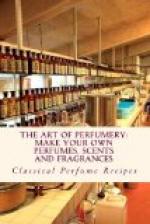After lip salve is poured into the pots and got cold, a red-hot iron must be held over them for a minute or so, in order that the heat radiated from the irons may melt the surface of the salve and give it an even face.
COMMON LIP SALVE
Is made simply of equal parts of lard and suet, colored with alkanet root, and perfumed with an ounce of bergamot to every pound of salve.
SECTION XII.
POMADES AND OILS.
The name of pomatum is derived from pomum, an apple, because it was originally made by macerating over-ripe apples in grease.
If an apple be stuck all over with spice, such as cloves, then exposed to the air for a few days, and afterwards macerated in purified melted lard, or any other fatty matter, the grease will become perfumed. Repeating the operation with the same grease several times, produces real “pomatum.”
According to a recipe published more than a century ago the form given is:—“Kid’s grease, an orange sliced, pippins, a glass of rose-water, and half a glass of white wine, boiled and strained, and at last sprinkled with oil of sweet almonds.” The author, Dr. Quincy, observes, that “the apple is of no significance at all in the recipe,” and, like many authors of the present day, concludes that the reader is as well acquainted with the subject as the writer, and therefore considers that the weights or bulk of the materials in his recipe are, likewise, of no significance. According to ancient writers, unguent, pomatum, ointment, are synonymous titles for medicated and perfumed greases. Among biblical interpreters, the significant word is mostly rendered “ointment;” thus we have in Prov. 27:9, “Ointment and perfume rejoice the heart;” in Eccles. 9:8, “Let thy head lack no ointment.”
Perfumers, acting upon their own or Dr. Quincy’s advice, pay no regard to the apples in the preparation of pomatum, but make it by perfuming lard or suet, or a mixture of wax, spermaceti, and oil, or some of them or all blended, to produce a particular result, according to the name that it bears.
The most important thing to consider in the manufacture of pomatum, &c., is to start off with a perfectly inodorous grease, whatever that grease may be.
Inodorous lard is obtained thus:—Take, say 28 lbs. of perfectly fresh lard, place it in a well-glazed vessel, that can be submitted to the heat of a boiling salt-water bath, or by steam under a slight pressure; when the lard is melted, add to it one ounce of powdered alum and two ounces of table salt; maintain the heat for some time, in fact till a scum rises, consisting in a great measure of coagulated proteine compounds, membrane, &c., which must be skimmed off; when the liquid grease appears of a uniform nature it is allowed to grow cold.




